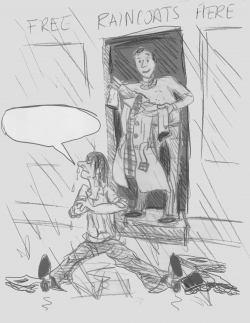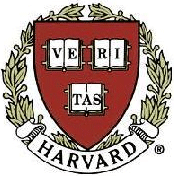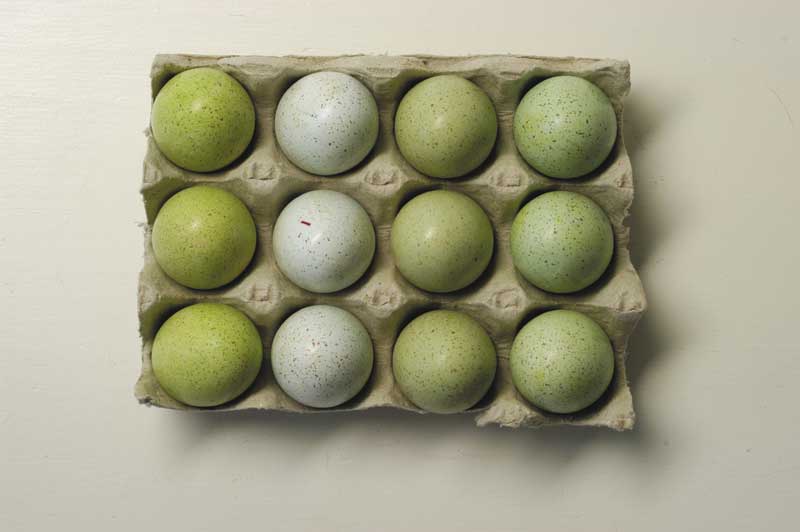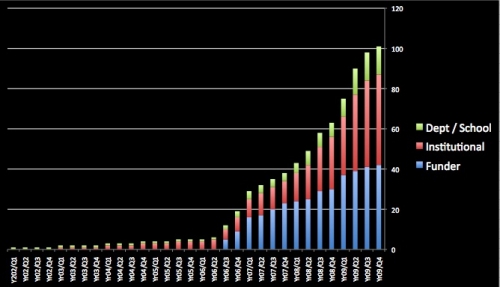Saturday, October 31. 2009
Raincoat Science: 43 More Open Access Haikus
 I've often reflected that OA is closer to raincoat science than rocket science. The essential message is super-simple:
I've often reflected that OA is closer to raincoat science than rocket science. The essential message is super-simple:You're losing research impact...
Make it free online
About as deep and complex as the following -- and yet, for two decades, the response has been Zeno's Paralysis:

Look kids, it's raining
Time to put on your raincoats...
Can't: against the law
Won't: no clouds I saw
Can't: branding's at risk
Won't: I must keep wet
Can't: which coat to choose?
Won't: my pay I'll lose
Can't: coats may go bad
Won't: drought risk increased
Can't: too much to do
Won't: rain's good for you
Can't: can't read instrux
Won't: need cheaper meds
Can't: standards at risk
Won't: risks towel biz
Can't: weathermen's needs
Won't: there's too much rain
Can't: the look's not right
Won't: let's wait sky-shield
Can't: trees need their jobs
Won't: might miss good drops
Can't: they have no tags
Won't: need weathercasts
Can't: careers at risk
Won't: steals druggists' biz
Can't: could dehydrate
Won't: lest I'm not first
Can't: which safe to wear?
Won't: wait for clime change
Can't: raincoats decay
Won't: cuts medics' pay
Can't: bankrupts brollies
Won't: parents' excess
Can't: global drying
Won't: disrupts climate
Can't: quality risk
Won't: false weathercasts
Can't: risks coat recall
Won't: not wet at all
Can't: can't fasten snaps
Won't: dries others up
Can't: god meant us wet
Won't: dry's not enough
Please feel free to use any of this to promote OA!
[Prior OA Haikus]
Friday, October 30. 2009
India's 3rd Green Open Access Self-Archiving Mandate: Planet's 105th

Added by: S. Krishnaswamy (Senior Professor, Nodal person for open access in MKU) mkukrishna AT gmail.com on 29 Oct 2009ROARMAP
OA Self-Archiving Mandate:
Madurai Kamaraj University (INDIA)
Institution's OA Eprint Archives:
[growth data] http://eprints.bicmku.in
eprints repository for School of Biotechnology from July 2009
Institution's/Department's OA Self-Archiving Policy:
IDOA - immediate deposit and optional access
Thursday, October 29. 2009
Authors Lacking OA Institutional Repository: Deposit In DEPOT International

To coincide with the start of Open Access week, EDINA (a JISC UK-national academic data centre based at the University of Edinburgh) is pleased to announce that the Depot has been opened up internationally. Building upon its initial role given to it by JISC, the Depot is now being opened up into a facility to support the Open Access agenda internationally.
The Depot is an assured gateway to make research Open Access - we provide two main services:1. a deposit service for researchers worldwide without an institutional repository in which to deposit their papers, articles, and book chapters (e-prints).The first time a researcher visits the Depot we will automatically check with OpenDOAR, the registry for open access repositories, to find a more appropriate local repository. If none exists then the author will be invited to deposit their research in the Depot. The Depot is OAI-compliant allowing deposited e-prints to be 'harvested' by search services, and other repositories, giving them instant global visibility.
2. a re-direct service which alerts depositors to more appropriate local services if they exist.
For the present you can find the Depot at http://www.depot.edina.ac.uk/ but working with eIFL-OA we hope to provide a more international URL to denote its new role.
Warm regards, Theo (on behalf of the Depot team)
Theo Andrew
Edinburgh University Library
& EDINA National Data Centre
Tel: 0131 651 3850 (Mon-Weds)
0131 6502913 (Thu - Fri)
Wednesday, October 28. 2009
JISC Podcast Interview with Robert Darnton About Harvard's Open Access Mandates
 Professor Robert Darnton, Carl H. Pforzheimer University Professor and Director of the University Library at Harvard has done a JISC podcast interview about Harvard's historic success in achieving faculty consensus on the adoption of an Open Access (OA) mandate in a number of Harvard's faculties.
Professor Robert Darnton, Carl H. Pforzheimer University Professor and Director of the University Library at Harvard has done a JISC podcast interview about Harvard's historic success in achieving faculty consensus on the adoption of an Open Access (OA) mandate in a number of Harvard's faculties.Professor Darnton's podcast is highly recommended. Just a few (minor) points of clarification:
1. Public Access. Although worldwide public access to universities' refereed research output is a desirable and welcome side-benefit of OA and OA mandates, a lot of research is, as Prof. Darnton points out, "esoteric," intended for and of direct interest only to specialists. It is the scholarly and scientific research progress that this maximized peer-to-peer access makes possible that confers the primary public benefit of OA. Pubic access and student/teacher access are secondary bonuses.
2. NIH Compliance Rate. Prof. Darnton referred to the very low (4%) rate of compliance with the NIH public access policy: That figure refers to the compliance rate during the first two years, when the NIH policy was merely a request and not a requirement. Once the NIH policy was upgraded to a mandate, similar to Harvard's, the compliance rate rose to 60% and is still climbing. (Achieving consensus on mandate adoption and achieving compliance with mandate requirements are not the same issue; nor is the question of which mandate to adopt.)
3. Covering Gold OA Publication Fees. As Prof. Darnton notes, the Harvard mandate (a "Green OA" mandate for Harvard authors to deposit -- in Harvard's OA Institutional Repository -- all their peer-reviewed final drafts of articles, published in any journal, whether a conventional subscription journal or a "Gold OA" journal) is about providing OA to Harvard's research output today, not about converting journals to Gold OA -- although Prof. Darnton anticipates that in perhaps a decade this may happen too. He and Professor Stuart Shieber, the architect of Harvard's successful consensus on adoption, both feel that it helps win author consensus and compliance -- to reassure those authors who may be worried about the future viability of their preferred journals -- to make some funds available to pay for Gold OA publication fees, should that be necessary. (This policy is just fine for a university, like Harvard, that has already mandated Green OA, but if Harvard's example is to be followed, universities should make sure first to mandate Green, rather than only offering to subsidize Gold pre-emptively.)
4. Journal Article Output vs. Book Output. The Harvard OA mandate covers journal article output, not book output. It would of course be a welcome outcome if eventually OA mandates made it possible for universities to save money on journal subscriptions, which could then be used to purchase books. But it must be clearly understood that not only does the OA mandate not touch books, but the economics of book publication are very different from the economics of journal publication, so even an eventual universal transition to Gold OA journal publication does not entail a transition to Gold OA book publication.
5. Compliance Rate With Opt-Out Mandates. It is important to understand also that the compliance rate for OA mandates with opt-out options, like Harvard's, compared to no-opt-out mandates is not yet known (or reported). (My own suggestion would still be that the best model for an OA mandate is the Immediate-Deposit/Optional-Access [ID/OA] mandate, which allows opt-out from OA, as the Harvard mandate does, but not from immediate deposit itself; ID/OA allows the institutional repository's "email eprint request" button to tide over user access needs during any publisher embargo period by providing "Almost OA" to Closed-Access deposits [what Prof. Darnton called "dark" deposits] during any publisher embargo.)
6. Proxy Deposit By Publishers. It is splendid that Harvard's Office for Scholarly Communication is providing help and support for Harvard authors in understanding and complying with Harvard's mandate, including proxy depositing of papers on authors' behalf. I am not so sure it is a good idea, though, to encourage the option of having the publisher do the Harvard author's deposit by proxy on the author's behalf (after an embargo of the publisher's choosing) as a means of complying with the mandate. Best to keep that in the hands of the author and his own institutional assigns...
Stevan Harnad
American Scientist Open Access Forum
Tuesday, October 27. 2009
Open Access Mandates #102, #103 & #104
 Mandates #99-#101 were registered ROARMAP just before OA week. During the week, there were three more:
Mandates #99-#101 were registered ROARMAP just before OA week. During the week, there were three more:#102 Seinäjoki University (Finland, Institutional)
#103 Universidad de Los Andes (Venezuela, Institutional)
#104 Trinity University (US, Institutional)
If your institution or funder has one that is not yet registered in ROARMAP, please do register it now!
Open Access Haikus and Senryus
Raincoat Science: 43 More Open Access Haikus
 Bill Hubbard has just announced the winner of the SHERPA "Spirit of Open Access" competition:
Bill Hubbard has just announced the winner of the SHERPA "Spirit of Open Access" competition: Set your research free
As flowers offer nectar
To the passing bee
Miggie Pickton, University of Northampton, UK
Here are my own (losing!) entries, submitted under the pseudonym of "Matthew Bashore," only five of them a strict 5/7/5, the rest increasingly minimalist. (My own entries and most of the others were, strictly speaking, more in the spirit of senryus than haikus.) (I've added a few, written since, that would have been dead giveaways.)
17:
scribbler and scholar
behind the self-same barrier
one unwillingly
the work of others
easier for me to steal
than donate my own
tithes to help cure plague
instead they're helping tradesmen
to peddle their wares
via eyes and minds
its path to noble laurels
my work firewalled
skies above all clear
cosmonauts still unembarked
worried flight's not clearedfingertips so quick13:
stroke keys to boycott others
not to free their own
golden sun afar
blinds us to greener vistas
open to our view
yearning for freedom
we do not reach out for it
though its in our grasp
set it free at last
no lets fuss instead about
costs rights wrath and gold
why lord gautama
left india for china
keeps our fingers still
the elean sage
found no way to cross the room
we too paralyzed
what the tortoise asked
achilles to try in vain
we now must mandate
scholars all are monks
do monks have buddha nature?
answer still is mu
give-away findings
free for all
no I want my cut
"roses red violets blue"
stays unread
till paid by you
eureka
see what I have found
first shell out to look
ideas doomed
to stillbirth
toll-booths loom ahead
11:
scholars' spring
skyward glance
trade winds gathering
new era
thoughts at long last free
pay to view
9:
fruits of IQ
unlike haiku
free
free at last
not so fast
toll-gates last
along the road
to Stockholm
toll-booths
8:
like speech
text if metered
lose/lose
7:
words fleet
script perdures
bits blocked
ideas
born free
enchained
me to you
no
first pay him
charity
pricily
sold
Friday, October 23. 2009
Don't Count Your Metric Chickens Before Your Open-Access Eggs Are Laid
 In "Open Access is the short-sighted fight" Daniel Lamire [DL] writes:
In "Open Access is the short-sighted fight" Daniel Lamire [DL] writes:DL: "(1) If scientific culture rewarded readership and impact above all else, we would not have to force authors toward Open Access."(a) University hiring and performance evaluation committees do reward impact. (It is no longer true that only publications are counted: their citation impact is counted and rewarded too.)
(b) Soon readership (e.g., download counts, link counts, tags, comments) too will be counted among the metrics of impact, and rewarded -- but this will only become possible once the content itself is Open Access (OA), hence fully accessible online, its impact measurable and rewardable. (See references cited at the end of this commentary under heading METRICS.)
(c) OA mandates do not force authors toward OA -- or no moreso than the universal "publish or perish" mandates force authors toward doing and publishing research: What these mandates do is close the loop between research performance and its reward system.
(d) In the case of OA, it has taken a long time for the world scholarly and scientific community to become aware of the causal connection between OA and research impact (and its rewards), but awareness is at long last beginning to grow. (Stay tuned for the announcement of more empirical findings on the OA impact advantage later today, in honor of OA week.)
DL: "You know full well that many researchers are just happy to have the paper appear in a prestigious journal. They will not make any effort to make their work widely available because they are not rewarded for it. Publishing is enough to receive tenure, grants and promotions. And the reward system is what needs to be fixed."This is already incorrect: Publishing is already not enough. Citations already count. OA mandates will simply make the causal contingency between access and impact, and between impact and employment/salary/promotion/funding/prizes more obvious and explicit to all. In other words, the reward system will be fixed (including the development and use of a rich and diverse new battery of OA metrics of impact) along with fixing the access system.
DL: "(2) I love peer review. My blog is peer reviewed. You are a peer and just reviewed my blog post."Peer commentary is not peer review (as surely I -- who founded and edited for a quarter century a rather good peer-reviewed journal that also provided open peer commentary -- ought to be in a position to know!). Peer commentary (as well as post-hoc metrics themselves) are an increasingly important supplement to peer review, but they are themselves neither peer review nor a substitute for it. (Again, see references at the end of this commentary under the heading PEER REVIEW.)
DL: "(3) PLoS has different types of peer review where correctness is reviewed, but no prediction is made as to the perceived importance of the work. Let me quote them:"You have profoundly misunderstood this, Daniel:“Too often a journal’s decision to publish a paper is dominated by what the Editor/s think is interesting and will gain greater readership — both of which are subjective judgments and lead to decisions which are frustrating and delay the publication of your work. PLoS ONE will rigorously peer-review your submissions and publish all papers that are judged to be technically sound. Judgments about the importance of any particular paper are then made after publication by the readership (who are the most qualified to determine what is of interest to them).”
(i) It is most definitely a part of peer review to evaluate (and where necessary correct) the quality, validity, rigor, originality, relevance, interest and importance of candidates for publication in the journal for which they are refereeing.
(ii) Journals differ in the level of their peer review standards (and with those standards co-vary their acceptance criteria, selectivity, acceptance rates -- and hence their quality and reliability).
(iii) PLoS Biology and PLoS Medicine were created explicitly in order to maintain the highest standards of peer review (with acceptance criteria selectivity and acceptance rates at the level of those of Nature and Science [which, by the way, are, like all peer judgments and all human judgment, fallible, but also corrigible post-hoc, thanks to the supplementary scrutiny of peer commentary and follow-up publications)).
(iv) PLoS ONE was created to cater for a lower level in the hierarchy of journal peer review standards. (There is no point citing the lower standards of mid-range journals in that pyramid as if they were representative of peer review itself.)
(vi) Some busy researchers need to know the quality level of a new piece of refereed research a-priori, at point of publication -- before they invest their scarce time in reading it, or, worse, their even scarcer and more precious research time and resources in trying to build upon it -- rather than waiting for months or years of post-hoc peer scrutiny or metrics to reveal it.
(v) Once again: commentary -- and, rarer, peer commentary -- is a supplement, not a substitute for peer review.
DL: "(4) Moreover, PLoS does publish non-peer-reviewed material, see PLoS Currents: Influenza for example."And the journal hierarchy also includes unrefereed journals at the bottom of the pyramid. Users are quite capable of weighting publications by the quality track-record of their provenance, whether between journals, or between sections of the same journal. Caveat Emptor.
METRICS:
Brody, T., Kampa, S., Harnad, S., Carr, L. and Hitchcock, S. (2003) Digitometric Services for Open Archives Environments. In Proceedings of European Conference on Digital Libraries 2003, pp. 207-220, Trondheim, Norway.
Harnad, S. (2006) Online, Continuous, Metrics-Based Research Assessment. Technical Report, ECS, University of Southampton.
Brody, T., Carr, L., Harnad, S. and Swan, A. (2007) Time to Convert to Metrics. Research Fortnight pp. 17-18.
Brody, T., Carr, L., Gingras, Y., Hajjem, C., Harnad, S. and Swan, A. (2007) Incentivizing the Open Access Research Web: Publication-Archiving, Data-Archiving and Scientometrics. CTWatch Quarterly 3(3).
Harnad, S. (2008) Self-Archiving, Metrics and Mandates. Science Editor 31(2) 57-59
Harnad, S. (2008) Validating Research Performance Metrics Against Peer Rankings. Ethics in Science and Environmental Politics 8 (11) The Use And Misuse Of Bibliometric Indices In Evaluating Scholarly Performance
Harnad, S., Carr, L. and Gingras, Y. (2008) Maximizing Research Progress Through Open Access Mandates and Metrics. Liinc em Revista 4(2).
Harnad, S. (2009) Multiple metrics required to measure research performance. Nature (Correspondence) 457 (785) (12 February 2009)
Harnad, S. (2009) Open Access Scientometrics and the UK Research Assessment Exercise. Scientometrics 79 (1) Also in Proceedings of 11th Annual Meeting of the International Society for Scientometrics and Informetrics 11(1), pp. 27-33, Madrid, Spain. Torres-Salinas, D. and Moed, H. F., Eds. (2007)
Harnad, S; Carr, L; Swan, A; Sale, A & Bosc H. (2009) Maximizing and Measuring Research Impact Through University and Research-Funder Open-Access Self-Archiving Mandates. Wissenschaftsmanagement 15(4) 36-41
PEER REVIEW:
Harnad, S. (1978) BBS Inaugural Editorial. Behavioral and Brains Sciences 1(1)
Harnad, S. (ed.) (1982) Peer commentary on peer review: A case study in scientific quality control, New York: Cambridge University Press.
Harnad, S. (1984) Commentaries, opinions and the growth of scientific knowledge. American Psychologist 39: 1497 - 1498.
Harnad, Stevan (1985) Rational disagreement in peer review. Science, Technology and Human Values, 10 p.55-62.
Harnad, S. (1986) Policing the Paper Chase. (Review of S. Lock, A difficult balance: Peer review in biomedical publication.) Nature 322: 24 - 5.
Harnad, S. (1995) Interactive Cognition: Exploring the Potential of Electronic Quote/Commenting. In: B. Gorayska & J.L. Mey (Eds.) Cognitive Technology: In Search of a Humane Interface. Elsevier. Pp. 397-414.
Harnad, S. (1996) Implementing Peer Review on the Net: Scientific Quality Control in Scholarly Electronic Journals. In: Peek, R. & Newby, G. (Eds.) Scholarly Publishing: The Electronic Frontier. Cambridge MA: MIT Press. Pp 103-118.
Harnad, S. (1997) Learned Inquiry and the Net: The Role of Peer Review, Peer Commentary and Copyright. Learned Publishing 11(4) 283-292.
Harnad, S. (1998/2000/2004) The invisible hand of peer review. Nature [online] (5 Nov. 1998), Exploit Interactive 5 (2000): and in Shatz, B. (2004) (ed.) Peer Review: A Critical Inquiry. Rowland & Littlefield. Pp. 235-242.
Harnad, S. (2003/2004) Back to the Oral Tradition Through Skywriting at the Speed of Thought. Interdisciplines. Retour a la tradition orale: ecrire dans le ciel a la vitesse de la pensee. Dans: Salaun, Jean-Michel & Vendendorpe, Christian (dir). Le défi de la publication sur le web: hyperlectures, cybertextes et meta-editions. Presses de l'enssib.
Harnad, S. (2003) BBS Valedictory Editorial. Behavioral and Brain Sciences 26(1)
Wednesday, October 21. 2009
Wrong Advice On Open Access: History Repeating Itself
 With every good intention, Jason Baird Jackson -- in "Getting Yourself Out of the Business in Five Easy Steps" is giving the wrong advice on Open Access, recommending a strategy that has not only been tried and has failed and been superseded already, but a strategy that, with some reflection, could have been seen to be wrong-headed without even having to be tried:
With every good intention, Jason Baird Jackson -- in "Getting Yourself Out of the Business in Five Easy Steps" is giving the wrong advice on Open Access, recommending a strategy that has not only been tried and has failed and been superseded already, but a strategy that, with some reflection, could have been seen to be wrong-headed without even having to be tried:• Choose not to submit scholarly journal articles or other works to publications owned by for-profit firms.In the year 2000, 34,000 biological researchers worldwide signed a boycott threat to stop publishing in and refereeing for their journals if those journals did not provide (what we would now call) Open Access (OA) to their articles.
• Say no, when asked to undertake peer-review work on a book or article manuscript that has been submitted for publication by a for-profit publisher or a journal under the control of a commercial publisher.
• Do not seek or accept the editorship of a journal owned or under the control of a commercial publisher.
• Do not take on the role of series editor for a book series being published by a for-profit publisher.
• Turn down invitations to join the editorial boards of commercially published journals or book series.
Their boycott threat was ignored by the publishers of the journals, of course, because it was obvious to them if not to the researchers that the researchers had no viable alternative. And of course the researchers did not make good on their boycott threat when their journals failed to comply.
The (likewise well-intentioned) activists who had launched the boycott threat then turned to another strategy: They launched the excellent PLoS journals (now celebrating their 5th anniversary) to prove that there could be viable OA journals of the highest quality. The experiment was a great success, and many more OA journals have since spawned, some of them (such as the BMC -- now Springer -- journals) of a quality comparable to conventional journals, some not.
But what also became apparent from the (now 9-year) exercise was that providing OA by creating new journals, persuading authors to publish in them instead of in their established journals, with their track-records for quality, and finding the funds to pay for the author publication fees that many of the OA journals had to charge (since they could no longer make ends meet with subscriptions) was a very slow and uncertain process.
There are at least 25,000 peer-reviewed journals published annually today, including a core of perhaps 5000 journals that constitute the top 20% of the journals in each field, the ones that most authors want to publish in, and most users want to access and use (and cite).
There are now about 5000 OA journals too, likewise about 20%, but most -- unlike the PLoS journals (and perhaps the BMC/Springer and Hindawi journals) -- are far from being among the top 20% of journals. Hence most researchers in 2009 face much the same problem that the signatories of the 2000 PLoS boycott threat faced in 2000: For most researchers, it would mean a considerable sacrifice to renounce their preferred journals and publish instead in an OA journal: either (more often) OA journals with comparable quality standards do not exist, or their publication charges are a deterrent.
Yet ever since 2000 (and earlier) there has been no need for either threats or sacrifice by researchers in order to have OA to all of the planet's peer-reviewed research output. For those same researchers who were signing boycott threats that they could not carry out could instead have used those keystrokes to make their own peer-reviewed research OA, by depositing their final, peer-reviewed drafts in OA repositories as soon as they were accepted for publication, to make them freely accessible online to all would-be users webwide, rather than just to those whose institutions could afford to subscribe to the journals in which they were published.
Researchers could have made all their research OA spontaneously since at least 1994. They could have done it OAI-compliantly (interoperably) since at least 2000.
But most researchers did not make their own research OA in 1994, nor in 2000, and even now in 2009, they seem to prefer petitioning publishers for it, rather than providing it for themselves.
There is a solution (and researchers themselves have already revealed exactly what it was when they were surveyed). That solution is not more petitions and more waiting for publishers or journals to change their policies or their economics. It is for researchers' institutions and funders to mandate that their researchers provide OA to their own refereed research by depositing their final, peer-reviewed drafts in OA repositories as soon as they are accepted for publication, to make them freely accessible online to all would-be users webwide, rather than just to those whose institutions can afford to subscribe to the journals in which they were published.
I would like to suggest that Jason Jackson (and other well-meaning OA advocates) could do incomparably more for global OA by lobbying their own institutions (and funders) to adopt OA mandates than by launching more proposals to boycott publishers who decline to do what researchers can already do for themselves. (And meanwhile, they should deposit their articles spontaneously, even without a mandate.)
OA Week 2009 would be a good time for the worldwide research community to come to this realization at long last, and reach for the solution that has been within its grasp all along.
(P.S. The correlation between whether a journal is published by a for-profit publisher and whether it is an OA journal is at best a weak one. The American Chemical Society is one of the most regressive of journal publishers, and it is not-for-profit. Springer and Hindawi are both OA publisher and for-profit. But in any case, neither the problem nor the solution resides in publishers, for-profit or not. Both the problem and the solution is entirely in the hands of the research community, the providers of all research content, and it resides at the end of their fingertips.)
Stevan Harnad
American Scientist Open Access Forum
Tuesday, October 20. 2009
To Open Canadian Universities' Minds, Inform Them What They Need To Do
 Michael's Geist's article "Canadian Universities Too Closed Minded on Open Access" is timely and welcome, but it is nonspecific about just what it is that Canadian universities are closed minded about (or what they can do about it).
Michael's Geist's article "Canadian Universities Too Closed Minded on Open Access" is timely and welcome, but it is nonspecific about just what it is that Canadian universities are closed minded about (or what they can do about it). It's not about Open Access publishing ("Gold OA"). Those few Canadian universities that are journal publishers at all, are only very minor ones. The decision about whether and when (if ever) to convert to Open Access publishing is in the hands of the big international publishers (whose journals are also the ones to which access is most needed by authors and users, both in Canada and in the rest of the world).
Nor is Canadian universities making some of their scarce funds available to pay for Open Access publishing charges going to provide much Open Access either.
For Canada, Open Access is about providing Open Access to Canada's own research output, so that all potential users worldwide can access, use, apply and build on it, not just those whose universities can afford to subscribe to the journal in which it happens to be published -- and so that the findings of the Canadian researchers who did the research, and their universities, and the research itself, can receive the full usage and impact that they deserve.
The way to make all this happen is for Canadian universities to mandate that the final draft of every research article their researchers publish, regardless of which journal it is published in, must also be deposited in the university's Open Access Institutional Repositories, to make the research freely accessible to all users online ("Green OA").
That is what Canadian universities need to do in order to make all Canadian research output Open Access. That's what Harvard and Stanford and MIT (and 100 other universities and research funders worldwide -- but not Cornell, nor Athabasca nor York, but only the Library Department at University at Calgary) have already done.
If you want Canadian Universities to open their minds to Open Access, you have to know what to put in their minds -- and it's about what they need to mandate that their own researchers put in their own repositories.
Stevan Harnad
American Scientist Open Access Forum
Saturday, October 17. 2009
Green Open Access Self-Archiving Mandates #99, #100 and #101 in ROARMAP
 With mandates 99-101 registered in ROARMAP, Green OA Self-Archiving Mandates have now passed the 100 mark -- seven years after they began, in 2002, with the very first one (University of Southampton's School of Electronics and Computer Science). The pace has at last picked up, especially since Harvard's mandate(s) last year, since which the number has doubled.
With mandates 99-101 registered in ROARMAP, Green OA Self-Archiving Mandates have now passed the 100 mark -- seven years after they began, in 2002, with the very first one (University of Southampton's School of Electronics and Computer Science). The pace has at last picked up, especially since Harvard's mandate(s) last year, since which the number has doubled.#99 (funder, Sweden) Swedish Research Council
#100 (institution, UK) University of Salford
#101 (institution, US) National Center for Atmospheric Research (NCAR)
We will be celebrating the Salford mandate (because it is a milestone, the 100th) but stay tuned as there are rumors several more mandates will be announced during next week's Open Access Week.
If your institution or funder has one that is not yet registered in ROARMAP, please do register it now!

(Page 1 of 2, totaling 11 entries)
» next page
EnablingOpenScholarship (EOS)
Quicksearch
Syndicate This Blog
Materials You Are Invited To Use To Promote OA Self-Archiving:
Videos:
audio WOS
Wizards of OA -
audio U Indiana
Scientometrics -
The American Scientist Open Access Forum has been chronicling and often directing the course of progress in providing Open Access to Universities' Peer-Reviewed Research Articles since its inception in the US in 1998 by the American Scientist, published by the Sigma Xi Society.
The American Scientist Open Access Forum has been chronicling and often directing the course of progress in providing Open Access to Universities' Peer-Reviewed Research Articles since its inception in the US in 1998 by the American Scientist, published by the Sigma Xi Society.
The Forum is largely for policy-makers at universities, research institutions and research funding agencies worldwide who are interested in institutional Open Acess Provision policy. (It is not a general discussion group for serials, pricing or publishing issues: it is specifically focussed on institutional Open Acess policy.)
You can sign on to the Forum here.
Archives
Calendar
Categories
Blog Administration
Statistics
Last entry: 2018-09-14 13:27
1129 entries written
238 comments have been made


